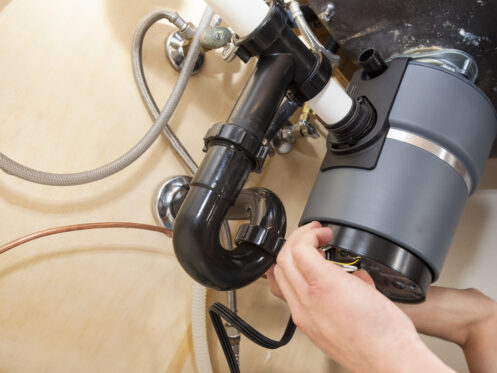Garbage disposal (also known as a garburator) is an essential kitchen appliance that helps dispose of food scraps quickly and easily. It works by grinding food waste into small particles using a rotating disc (impeller plate) inside the unit. Although efficient and effective, there may come a time when the rotating disc stops turning. This shouldn’t be a cause for panic, as you can resolve this problem with a few simple steps. Here’s how to go about it.
Understanding Your Garburator
It’s easier to fix something when you understand its main components and how they work. A garbage disposal unit consists of a motor, a grinding chamber, and impellers. When you turn it on, electricity flows to the motor, which powers the rotating impellers inside the grinding chamber. These impellers push food against the walls of the grinding chamber, pulverizing it into tiny particles. The finely ground food waste is then flushed out of the unit into the plumbing system with running water.
Garburators are equipped with several safety features to protect the user and the appliance itself. First, the spinning blades are not actually sharp. Instead, they rely on centrifugal force and blunt edges to grind food effectively. You’ll never get cut or injured by accidentally touching the impellers while cleaning or inspecting the unit.
Second, garburators have a feature known as an “overload protector,” which shuts off the unit when it detects a jam or overload. Third, located at the top of the disposal, there is a splash guard designed to prevent food particles and water from splashing out of the drain during operation. Lastly, all garbage disposal units come with a manual reset button that allows users to restart the appliance after it has shut down due to a jam or power interruption.
Garbage Disposal Refuses To Turn On at All
If the garbage disposal unit doesn’t do anything when you flip the switch, you may have electrical issues or a broken motor. Check your electrical panel to see if the breaker has tripped. Flipping it back on should restore power.
However, you need to investigate your unit to understand why it is causing your circuit breaker to trip. Perhaps the disposal’s wiring is loose, frayed, or improperly connected. Another possibility is that the motor is overheating or drawing too much power. In this case, you will need professional assistance.
A faulty switch could also prevent the unit from turning on at all. Inspect the wall switch for signs of damage, such as cracks, discoloration, or a loose connection. If you have a multimeter, test the switch for continuity. If it has a problem, replace it immediately. Don’t let a faulty switch supply power to your garbage disposal unit, as it can completely damage it.
Additionally, check the internal reset button, usually found on the bottom of the unit. Sometimes, this button trips and needs to be manually reset.
Garbage Disposal Hums and Won’t Turn
If your garbage disposal hums, it means that it is receiving power, but the motor cannot turn the blades. This could be due to clogs or a jammed flywheel.
Start by inspecting the disposal with a flashlight to check for any visible obstructions. Utensils, large food particles, and other debris lodged in the grinding chamber can cause the unit to jam. If any are present, use tongs to remove them carefully.
Next, insert an Allen wrench into the hexagonal hole on the bottom of the disposal unit and manually rotate the flywheel clockwise to loosen the jam. Run cold water through the disposal, and then turn it on to see if it works.
Garbage Disposal Produces Smoke When Running, Then Turns Off
If your garbage disposal unit starts smoking and then turns off shortly after, you may have an overheating motor or a faulty electrical connection. Turn the power off immediately and call for help. Troubleshooting and fixing this is not a DIY job.
Motors overheat when the unit is run for too long or when something prevents it from moving properly. This excessive strain causes smoke to emerge as the internal components heat up. If the motor is burnt out, the only solution is to replace the entire system.
Signs of Impending Garbage Disposal Failure
A garbage disposal that refuses to turn on is usually the final stage of an unresolved issue. Before your unit reaches this point, you’ll often encounter other problems, including:
Slow Drains
If your garbage disposal water backs up or drains very slowly, you are either stuffing too much food waste into it, or it is blocked. Attempt to clean the unit by letting it grind ice cubes, which dislodge debris and buildup from the grinding chamber. You can also pour a mixture of baking soda and vinegar into the disposal and let it sit for a few minutes before rinsing with cold tap water. A mixture of baking soda and vinegar creates a fizzy reaction that helps break down grease, grime, and residue inside the disposal and pipes.
Leaking Garbage Disposal
The constant vibration of the garbage disposal unit during operation can loosen the mounting apparatus that holds it in place. This can cause leaks to occur at the top, where it connects to the sink flange. At the bottom, near the motor. Or at the pipes that drain wastewater from the unit. To address this, tighten loose screws or bolts, and replace the sink flange and rubber seals at the base if they are worn out.
If leaks persist, your garbage disposal unit may be cracked or corroded. Hire a licensed plumber to replace it.
The Unit Produces Loud Sounds
If your unit is making a rattling sound, the rotating discs are most likely clanging around an object. Turn it off and remove the object using tongs. However, if there is no object, the steel bolts holding the rotating discs may be loose. To troubleshoot, tighten them.
Gurgling sounds may be coming from a clogged drain line. Use a degreaser to remove stuck grease and residue, and then grind ice cubes to dislodge any remaining debris.
Maintaining a Garbage Disposal
Avoid putting plastics, nuts, animal bones, fibrous vegetables, and seeds down the garbage disposal. These items don’t grind easily. They will likely jam the blades, causing the motor to overheat and shut down.
Moreover, only run cold water when using the disposal unit. Hot water can melt grease and fat, which will then cool down and solidify within the grinding chamber or down the pipes.
Finally, whenever you notice any issues with your system, call a professional to inspect and repair it immediately. Operating a faulty unit leads to further damage, increases repair costs, and shortens the appliance’s lifespan.
Contact Fox Heating, Cooling & Plumbing for More Information
If you are running into trouble, Fox Heating, Cooling & Plumbing can help repair or replace your faulty garbage disposal unit. Our plumbers bring decades of experience to every job, ensuring high-quality workmanship and efficient solutions. Additionally, reach out to us for drain cleaning, kitchen sink upgrades, and general plumbing services. Need garbage disposal repair or replacement? Contact Fox Heating, Cooling & Plumbing in Wheat Ridge today.

